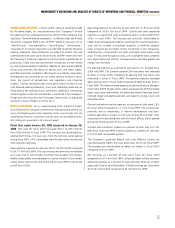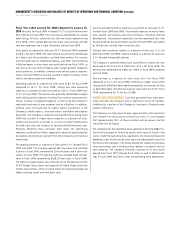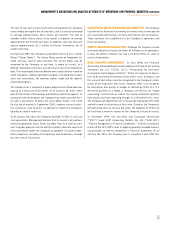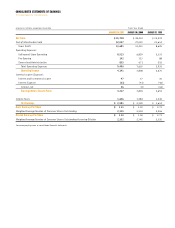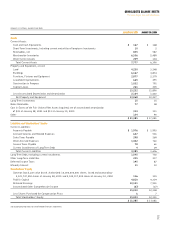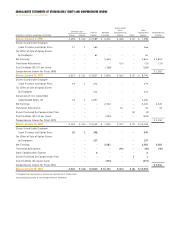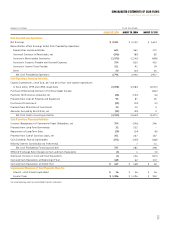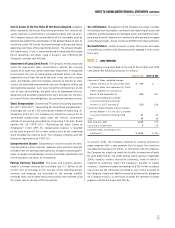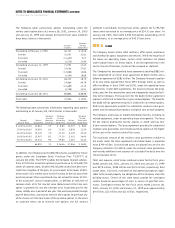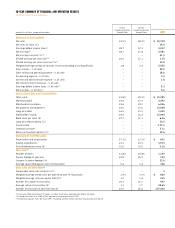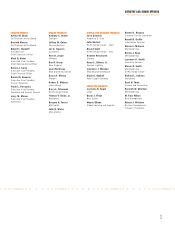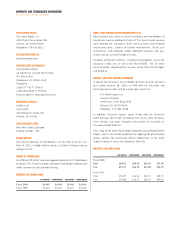Home Depot 2000 Annual Report Download - page 29
Download and view the complete annual report
Please find page 29 of the 2000 Home Depot annual report below. You can navigate through the pages in the report by either clicking on the pages listed below, or by using the keyword search tool below to find specific information within the annual report.
Notes to Consolidated Financial Statements (continued)
The Home Depot, Inc. and Subsidiaries
26
27
Note 4. Employee Stock Plans
The 1997 Omnibus Stock Incentive Plan (“1997 Plan”) provides that
incentive stock options, non-qualified stock options, stock apprecia-
tion rights, restricted stock and deferred shares may be issued to
selected associates, officers and directors of the Company. The maxi-
mum number of shares of the Company’s common stock available for
issuance under the 1997 Plan is the lesser of 225 million shares or
the number of shares carried over from prior plans plus one-half
percent of the total number of outstanding shares as of the first day
of each fiscal year. In addition, restricted shares issued under the
1997 Plan may not exceed 22.5 million shares. As of January 28,
2001, there were 130,691,447 shares available for future grants
under the 1997 Plan.
Under the 1997 Plan and prior plans, the Company has granted
incentive and non-qualified options for 126,219,271 shares, net of
cancellations (of which 62,918,031 had been exercised). Incentive
stock options vest at the rate of 25% per year commencing on the
first anniversary date of the grant and expire on the tenth anniversary
date of the grant. The non-qualified options have similar terms; however,
vesting does not generally begin until the second anniversary date
of the grant.
Under the 1997 Plan and prior plans, 92,495 shares of restricted
stock, net of cancellations (of which 2,268 had been exercised) have
been granted. The restricted shares vest over varying terms and are
generally based on the attainment of certain performance goals. The
expected fair value of the restricted shares on the vesting dates will
be charged to expense ratably over the vesting periods unless it is
determined that the performance goals will not be met.
In December 2000, the Company entered into an agreement with a
key officer. Under the Non-Qualified Stock Option and Deferred Stock
Units Plan and Agreement, the Company issued 2,500,000 non-
qualified stock options with an exercise price of $40.75 per share and
also issued 750,000 deferred stock units. Both the non-qualified options
and deferred units vest 20% per year commencing on the grant date.
The non-qualified options expire on the tenth anniversary of the vest-
ing date. Each deferred stock unit entitles the officer to one share of
common stock to be received approximately two years after the vest-
ing date of the deferred stock unit, subject to certain deferral rights
of the officer. The fair value of the 750,000 deferred stock units granted
is being amortized based upon the vesting dates. The Company recorded
stock compensation expense of approximately $6 million in fiscal 2000.
The per share weighted average fair value of stock options granted
during fiscal years 2000, 1999 and 1998 was $31.96, $18.86 and
$9.94, respectively. The fair value of these options was determined at
the date of grant using the Black-Scholes option-pricing model with
the following assumptions:
Stock Options
Granted in Fiscal Year
2000 1999 1998
Risk-free interest rate
6.4%
5.1% 5.6%
Expected volatility of common stock
54.6%
51.6% 45.7%
Dividend yield
0.3%
0.3% 0.4%
Expected option term
7 years
5 years 5 years
The Company applies APB 25 in accounting for its stock plans and,
accordingly, no compensation costs have been recognized in the
Company’s financial statements for incentive or non-qualified stock
options granted. If, under SFAS 123, the Company determined com-
pensation costs based on the fair value at the grant date for its stock
options, net earnings and earnings per share would have been reduced
to the pro forma amounts below (in millions, except per share data):
Fiscal Year Ended
January 28, 2001 January 30, 2000 January 31, 1999
Net Earnings
As reported
$ 2,581
$ 2,320 $ 1,614
Pro forma
$ 2,364
$ 2,186 $ 1,527
Basic Earnings per Share
As reported
$1.11
$ 1.03 $ 0.73
Pro forma
$1.02
$ 0.97 $ 0.69
Diluted Earnings per Share
As reported
$1.10
$ 1.00 $ 0.71
Pro forma
$1.01
$ 0.94 $ 0.67


